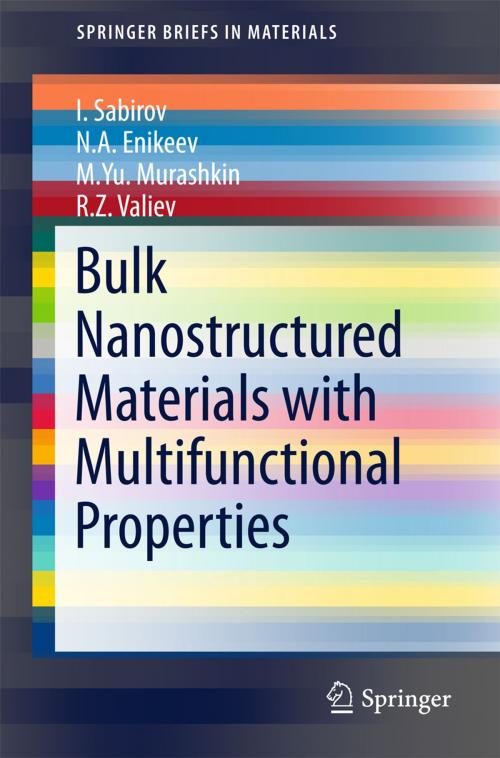Bulk Nanostructured Materials with Multifunctional Properties
Nonfiction, Science & Nature, Science, Other Sciences, Nanostructures, Technology, Nanotechnology| Author: | I. Sabirov, N.A. Enikeev, M.Yu. Murashkin, R.Z. Valiev | ISBN: | 9783319195995 |
| Publisher: | Springer International Publishing | Publication: | September 1, 2015 |
| Imprint: | Springer | Language: | English |
| Author: | I. Sabirov, N.A. Enikeev, M.Yu. Murashkin, R.Z. Valiev |
| ISBN: | 9783319195995 |
| Publisher: | Springer International Publishing |
| Publication: | September 1, 2015 |
| Imprint: | Springer |
| Language: | English |
This book presents a multifunctional approach to the design of bulk nanostructured metals through severe plastic deformation (SPD). Materials engineering has traditionally involved selecting a suitable material for a given application. However, modern engineering frequently requires materials with a set of multifunctional, often conflicting properties: Enhanced mechanical properties need to be combined with improved physical (electrical, magnetic, etc.) and/or chemical (corrosion resistance, biocompatibility) properties. So disparate materials properties need to be engineered and optimized simultaneously. These requirements have created a paradigm shift in which the classical materials selection approach is replaced by design of material microstructures to achieve certain performance requirements, subject to constraints on individual properties such as strength, conductivity, and corrosion resistance. Written by researchers at the forefront of this new materials design approach, the present volume provides a comprehensive introduction to multifunctional design of bulk nanostructured materials, with applications ranging from hydrogen storage to construction engineering.
This book presents a multifunctional approach to the design of bulk nanostructured metals through severe plastic deformation (SPD). Materials engineering has traditionally involved selecting a suitable material for a given application. However, modern engineering frequently requires materials with a set of multifunctional, often conflicting properties: Enhanced mechanical properties need to be combined with improved physical (electrical, magnetic, etc.) and/or chemical (corrosion resistance, biocompatibility) properties. So disparate materials properties need to be engineered and optimized simultaneously. These requirements have created a paradigm shift in which the classical materials selection approach is replaced by design of material microstructures to achieve certain performance requirements, subject to constraints on individual properties such as strength, conductivity, and corrosion resistance. Written by researchers at the forefront of this new materials design approach, the present volume provides a comprehensive introduction to multifunctional design of bulk nanostructured materials, with applications ranging from hydrogen storage to construction engineering.















